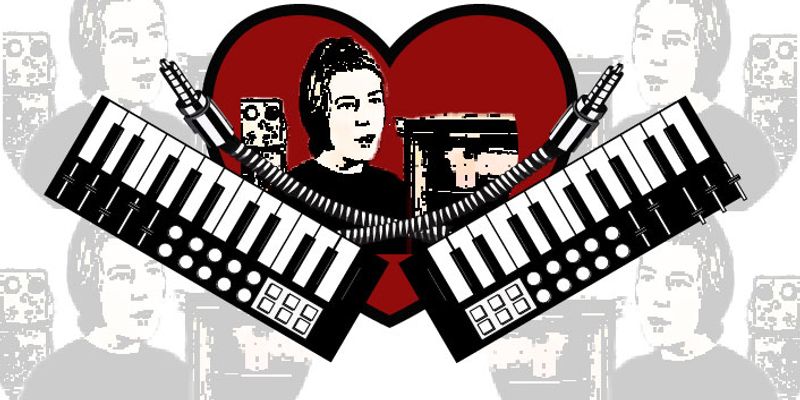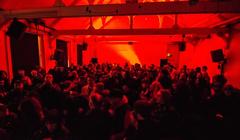Long Read / 08 Mar 24
Female Pioneers of Electronic Music - Delia Derbyshire
Roxy Caruana

When I was a kid I didn't know anything about Delia Derbyshire or the BBC as I grew up in Italy. But, I knew for sure that I was intrigued by the Doctor Who theme track and still I am.
Delia Derbyshire was a genius. She had a knack for both mathematics and music and her career has been consistent and in line with her aspirations, but with many difficulties for the same old reason: she was a woman. Delia was born in Coventry, England, in 1937.
Her early education at Coventry Grammar School and Girton College, Cambridge, where she earned a degree in mathematics and music, set the foundation for her illustrious career.
In 1959, she was denied a position at Decca Records because of her sex.
She didn't give up, so Delia took a detour to work for the UN in Geneva before returning to London to work for music publishers Boosey & Hawkes.
In 1960, she joined the BBC as a trainee studio manager. Her talent and dedication saw her excel in this role and joined the fledgling Radiophonic Workshop.
This marked the beginning of what is still referred to as the Golden Age of the Radiophonic Workshop.
Delia's contributions at the Radiophonic Workshop were revolutionary.
As the sole member with advanced music qualifications, she brought an innovative approach to sound and music production, leaving a lasting impact on her colleagues. Her iconic creation, the Doctor Who theme, remains one of the most recognisable TV themes to date, crafted in 1963 in collaboration with Grainer. However, bureaucratic hurdles at the BBC hindered Grainer's attempt to credit Delia as a co-composer, as the workshop's anonymity was preferred by the organization.
Delia's Style at The BBC Radiophonic Workshop
She blended both tangible sounds from real objects and recorded sounds through the use of Musique Concrète techniques. Delia harnessed real-world objects like bells, bottles, and clocks from the BBC Radiophonic Workshop's eclectic collection. One standout discovery was the resonant chime of an old industrial metal lampshade, a cherished found sound.
Beyond physical objects, Delia explored the electronic test equipment inherited from other BBC departments. In the absence of synthesizers in the early 1960s, the Workshop ingeniously crafted a "keying unit." This contraption comprised calibrated signal generators tuned to musical notes and an octave keyboard fashioned from keys salvaged from a dismantled piano.
Delia's resourcefulness extended to magnetic tapes, where she expertly synchronised machines manually during mixing or used a remote control box for simultaneous starts. The recorded sounds, once captured on tape, became the building blocks for her compositions. Delia's creativity soared as she manipulated these sounds, employing techniques such as cutting and splicing the tape to unlock a myriad of exciting possibilities.
Her on-screen credit finally came with Doctor Who's 50th-anniversary special, The Day of the Doctor. Delia's initial arrangement remained the main theme for the first seventeen series, spanning from 1963 to 1980. However, subsequent re-workings over the years didn't sit well with her, as the only version she approved of was the original composition.
Other Collaborations
Delia's talent extended beyond the confines of the Radiophonic Workshop. She was called upon to create music for drama and documentary programmes, science, arts and educational programmes, and her abstract style was well-suited to these tasks.
Her work with Barry Bermange 1964–65 on the four Inventions for Radio is perhaps the best instance of her intuitive way with soundscaping. It was a series of collages of people describing their thoughts on dreams, belief in God, the possibility of life after death, and the experience of old age, voiced over an electronic soundscape.
She also collaborated with renowned composers such as Sir Peter Maxwell Davies, Roberto Gerhard, and Ianni Christou, doing sound treatments of their orchestral music. She was also an assistant to Luciano Berio at the 1962 Dartington summer school.
Despite facing criticism at the Workshop, (she was told that her music was 'too lascivious for 11-year-olds' and 'too sophisticated for the BBC2 audience) Delia found other avenues to express her creativity. She worked in film, theatre, 'happenings', original electronic music events, pop music and avant-garde psychedelia. She also encouraged the establishment of private electronic music studios like Unit Delta Plus, Kaleidophon and Electrophon.
She left the BBC in 1973 and worked briefly at Hodgson's Electrophon studio where she contributed to the soundtrack to the film The Legend of Hell House.
She also composed a score for Yoko Ono's short film Wrapping Event, but unfortunately, the copy of the film with the soundtrack got lost.
She stopped creating music in 1975 and worked, in different places such as a bookstore and an art gallery.
She then back to music in 2001 providing sounds used as source material to Sychrondipity Machine (Taken from an Unfinished Dream), a 55-second track for the compilation Grain: A Compilation of 99 Short Tracks, released by Dot Dot Dot Music. She died before the release and was credited in the compilation.
Sadly, her latest years were difficult as she struggled with alcoholism. She died of cancer, in July 2001, when she was 64.
Delia Derbyshire's talent still resonates and influences the music industry. Her works are still broadcast on radio and TV, and she is often credited and covered by many bands from Add n, Sonic Boom, Aphex Twin, The Chemical Brothers and Orbital.
Here at Artcore, we strongly believe in inclusivity and we value female and non-binary talents; upload your music here today.
Delia Derbyshire
BBC
Doctor Who
electronic music
musique concrete
female pioneer
female composer


